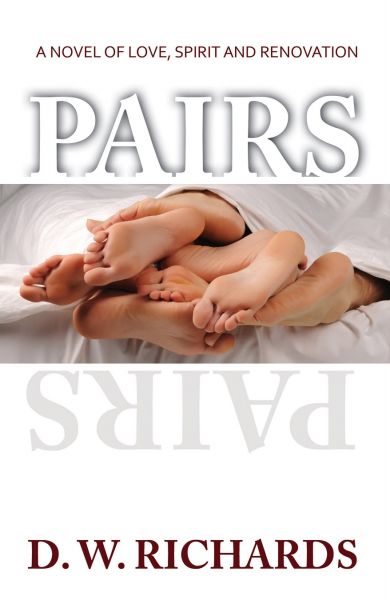 Synopsis:
Synopsis:
Kaylie is a single mother to little Terra, who, at four years of age, is extremely intuitive. Perhaps even psychic. Kayley writes greeting card verses for a living, and recites poetry appropriate for any occasion. Her house needs to be remodeled, so Adam is enlisted by her friend Helen to assist Kayley free of charge. Adam is, of course, handsome, charming, a bit younger, and totally smitten with the zaftig Kayley.
Adam is also Henry’s cousin. (Helen is Henry’s step-sister.) A math teacher, Henry has decided to explore his sexuality because he is tired of dead-end relationships with women. He meets Alexandra, a waitress in a local restaurant. Before long, they strike up a friendship and Henry realizes that Alexandra, intriguing and beautiful, is keeping secrets that relate to her past and her identity. Alexandra finds Henry attractive because, even though he is a guy, he is really her best girlfriend — he cooks, decorates and, most importantly, identifies emotionally with women.
Soon the two couples develop a friendship and, when Adam’s boss advises about a fixer-upper home in a neighborhood that is undergoing a renaissance and becoming very desirable, Adam realizes that if the four of them invest in the property and work together, they can turn a profit. As the renovation proceeds, the two couples’ lives become increasingly intertwined and Kayley determines to give Alexandra and Henry an extremely special gift, despite Adam’s initial misgivings. Kayley also finds herself coming to terms with past relationships, while Alexandra and Henry move forward in theirs. Alexandra’s love for Henry and commitment to him motivates her to work at recovering from her troubled past, as well.
Review:

In many respects, the book is enjoyable because Richards has created likable, empathetic, and, especially with regard to Henry and Alexandra, intriguing characters. Alexandra, for instance, has a very troubled past which has caused her, when she first meets Henry, to adopt an alternate identity. Henry is mesmerized by her, but also fearful because he is unsure of her age and, as a teacher, must guard against embarking upon an inappropriate romance. He is drawn to Alexandra’s beauty, to be sure, but she is also intelligent, articulate, and extremely brave. Perhaps too brazen, in some respects. As her secrets are revealed, Henry finds himself falling deeper in love with her. For Alexandra’s part, she is entranced by Henry because he is sensitive and compassionate — completely unlike any man she has ever known. They are a decidedly odd couple, but one that Richards’ readers will definitely find themselves cheering on as their romance blossoms.
The explanation offered by Richards for Alexandra’s “over-the-top” behaviors is plausible, but it does not account for the reactions to her conduct or the complicity therein of Richards’ other female characters. As Alexandra acts out with Kayley, Helen, and some of the other supporting female characters, it is blatantly obvious that Richards has really written those parts of the story from his own decidedly male perspective. The sexual experimentation in which the women engage does not read like legitimate, credible explorations of female sexuality. Rather, Richards’ increasingly gratuitous forays into female sexual encounters read more like the fantasies of a heterosexual high school boy.
Richards also writes himself into a bit of a corner with his two couples after they purchase the run-down home and begin renovating it. A metaphor for the healing occurring in the characters’ lives, Richards’ foursome end up living together, all caring for Terra. Plenty of sexual escapades ensue. To invest in the story, readers must be willing to suspend their disbelief, not just as to the financial and logistical realities of such a project and arrangement. The behaviors in which Kayley and Alexandra engage, not to mention the reactions of Adam and Henry, don’t just strain credulity; much of the action actually interfered with my ability to empathize with and feel compassion for Richards’ otherwise charming and endearing characters. My reaction was not based upon prudish sensibilities, but was, rather, informed by plot twists implemented by Richards that felt voyeuristic and manipulative.
Richards says that he writes to entertain, and he believes that the real entertainment value of Pairs is “rooted in how preconceptions are dealt with. Specifically, the story examines the definitions of gender roles, love, and to a lesser and admittedly ambiguous extent, existence.” Richards comes closest to attaining his goal with the tender and poignant aspects of the relationship he crafts between Henry and Alexandra. To a lesser extent, he succeeds with Kayley, who achieves clarity, understanding, and a sense that she has come full circle with regard to a past relationship that was pivotal to her emotional development. Her journey would have felt more profound had Richards refrained from having her engage some of the unbelievable behavior discussed above.
What Richards has actually accomplished with Pairs is this: He has gotten his tale off to a very good start. What the book really needs, however, if it is to actually succeed as “women’s fiction,” is some no-nonsense editing and refinement — by a woman — particularly with respect to female viewpoints of the theme of sexual exploration and healing.



2 Comments
[New Post] Book Review: Pairs https://www.jhsiess.com/2011/01/21/book-r…
Very engaging book. Already from the review itself I can say this is engaging book. Entertaining also because somewhat the story is hilarious. Great post, I enjoy reading. =)